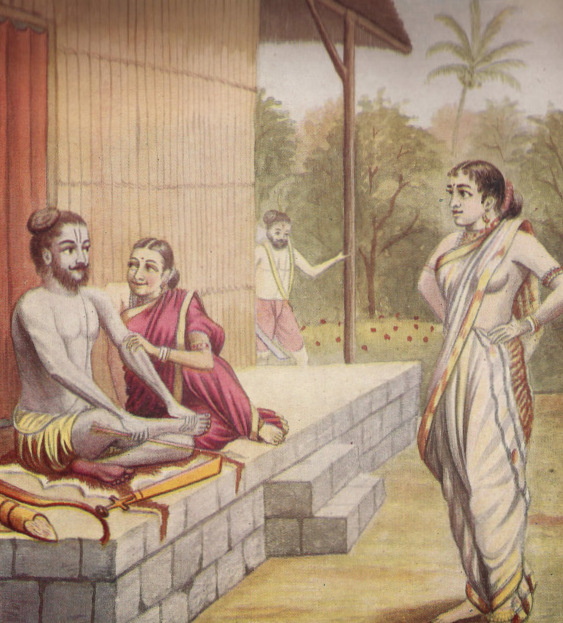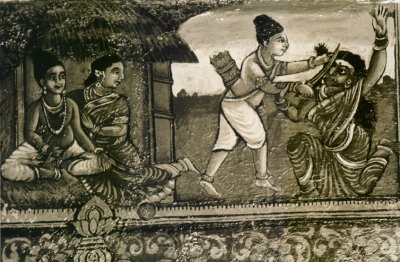Surpanakha on:
[Wikipedia]
[Google]
[Amazon]
Shurpanakha (
 Shurpanakha's appearance has drastic differences in the different versions of the epic. Most versions including the Valmiki's
Shurpanakha's appearance has drastic differences in the different versions of the epic. Most versions including the Valmiki's
 According to Valmiki, she met the exiled Prince
According to Valmiki, she met the exiled Prince  Shurpanakha first went to her brother Khara, who sent seven ''
Shurpanakha first went to her brother Khara, who sent seven ''

Sanskrit
Sanskrit (; attributively , ; nominally , , ) is a classical language belonging to the Indo-Aryan branch of the Indo-European languages. It arose in South Asia after its predecessor languages had diffused there from the northwest in the late ...
: शूर्पणखा, , ), also known as Meenakshi, is a ''rakshasi
Rakshasas ( sa, राक्षस, IAST: : Pali: ''rakkhaso'') lit. 'preservers' are a race of usually malevolent demigods prominently featured in Hindu mythology. According to the Brahmanda Purana, the rakshasas were created by Brahma wh ...
'' (demoness) in Hindu Mythology. Her legends are mainly narrated in the epic ''Ramayana
The ''Rāmāyana'' (; sa, रामायणम्, ) is a Sanskrit literature, Sanskrit Indian epic poetry, epic composed over a period of nearly a millennium, with scholars' estimates for the earliest stage of the text ranging from the 8th ...
'' and its other versions. She was the sister of Lanka's king, Ravana
Ravana (; , , ) is a rakshasa king of the island of Lanka, and the chief antagonist of the Hindu epic ''Ramayana'' and its adaptations.
In the ''Ramayana'', Ravana is described to be the eldest son of sage Vishrava and rakshasi Kaikesi. ...
, and the daughter of the sage Vishrava
Vishrava (), also called Vishravas, is the son of Pulastya, and a powerful rishi (sage), as described in the Hindu epic Ramayana. A scholar par excellence, he earned great powers through the performance of tapasya, which in turn, earned him g ...
and the rakshasi Kaikeshi. Shurpanakha's role in the original epic is small, yet significant.
Appearance
 Shurpanakha's appearance has drastic differences in the different versions of the epic. Most versions including the Valmiki's
Shurpanakha's appearance has drastic differences in the different versions of the epic. Most versions including the Valmiki's Ramayana
The ''Rāmāyana'' (; sa, रामायणम्, ) is a Sanskrit literature, Sanskrit Indian epic poetry, epic composed over a period of nearly a millennium, with scholars' estimates for the earliest stage of the text ranging from the 8th ...
mention her to be an ugly woman. When Shurpanakha first sees Rama in the forest, Valmiki describes her as facially unpleasant, pot-bellied, wry-eyed, coppery-haired, ugly featured, brassy-voiced, deplorably oldish, a crooked talker, ill-mannered, uncouth and abominable. In contrast, the Kamba Ramayanam
''Ramavataram'', popularly referred to as ''Kamba Ramayanam'', is a Tamil epic that was written by the Tamil poet Kambar during the 12th century. Based on Valmiki's ''Ramayana'' (which is in Sanskrit), the story describes the life of King ...
describes her as a lovelorn and beautiful woman, attributing her behaviour to loneliness and thus humanising her.
Early life
Kaikesi
''Ramayana'' is one of the two major Sanskrit ancient epics (''Itihasa''s) of Hindu literature. It was composed by sage Valmiki. This is a list of important characters that appear in the epic.
A
Agastya
Agastya was a son of sage Pulastya ...
, daughter of Sumali, married Maharshi Vishrava
Vishrava (), also called Vishravas, is the son of Pulastya, and a powerful rishi (sage), as described in the Hindu epic Ramayana. A scholar par excellence, he earned great powers through the performance of tapasya, which in turn, earned him g ...
and became his second wife. She gave birth to five children four sons and a daughter. The four sons were Sahasraskanda (later known as Sahastra Ravan), Ravan, Kumbhakarna, and Vibhishan.The daughter was named Shurpanakha. She was also given the name of Mīnakṣī "Dīkṣa" at birth, and some also called her "Candraṇakhā" (the one with nails like the moon). According to some Bengali/Odishi folklores, when Shurpanakha was young, She used to take the form of a beautiful woman to lure young unmarried men who were not from Lanka, after that she used to give them a magical potion she stole from Goddess Rati. After drinking the potion, those men used to shrink in size, their height used to become 1-1.5 anguli pramana (5-6 inches). Then she used to gift those men to many unmarried maidens in Lanka . When Ravana's son Meghnada captured Indra, Shurpanakha was attracted to Indra and used that magical potion on Indra. But before she could fullfill her lust, Indra escaped.
Marriage and widowhood
The popular story of Shurpanakha's marriage originated from a Tamil folktale and was absorbed into the Ramayana. As per the story, when Shurpanakha grew up, she secretly married the Danava prince of the Kalkeya Danava clan, Vidyutjihva. Ravana became enraged with Shurpanakha for marrying a Danava. The Danavas were the mortal enemies ofRakshasas
Rakshasas ( sa, राक्षस, IAST: : Pali: ''rakkhaso'') lit. 'preservers' are a race of usually malevolent demigods prominently featured in Hindu mythology. According to the Brahmanda Purana, the rakshasas were created by Brahma when ...
, and he was about to punish her, but Mandodari convinced him to respect the wishes of his sister. Thus Ravana accepted Shurpanakha, her husband and Danavas as relatives officially.
At the time of conquering Rasatala (the underworld), Ravana killed Vidyutjihva. The reason of Ravana's act is different from text to text Some claim that he accidentally killed Vidyutjihva, while other state that in Shurpanakha's absence, Vidyutjihva attacked Ravana, who in self-defense killed his brother-in-law.Valmiki Ramayan by Rajshekhar Basu - Uttarkanda This caused Shurpanakha a great displeasure, and after seeing his sister's grief, Ravana asked her to roam and search for another husband. Shurpanakha then split her time between Lanka and the woods of Southern India
South India, also known as Dakshina Bharata or Peninsular India, consists of the peninsular southern part of India. It encompasses the Indian states of Andhra Pradesh, Karnataka, Kerala, Tamil Nadu, and Telangana, as well as the union territ ...
, sometimes living with her forest-dwelling Asura relatives, Khara and Dushana, on Ravana
Ravana (; , , ) is a rakshasa king of the island of Lanka, and the chief antagonist of the Hindu epic ''Ramayana'' and its adaptations.
In the ''Ramayana'', Ravana is described to be the eldest son of sage Vishrava and rakshasi Kaikesi. ...
's orders. She also had conceived a son by Vidyutjihva known as Shambhri who was accidentally killed by Lakshmana.
Encounter with Rama, Sita and Lakshmana
 According to Valmiki, she met the exiled Prince
According to Valmiki, she met the exiled Prince Rama
Rama (; ), Ram, Raman or Ramar, also known as Ramachandra (; , ), is a major deity in Hinduism. He is the seventh and one of the most popular '' avatars'' of Vishnu. In Rama-centric traditions of Hinduism, he is considered the Supreme Bein ...
of Ayodhya
Ayodhya (; ) is a city situated on the banks of holy river Saryu in the Indian state of Uttar Pradesh.
Ayodhya, also known as Saketa, is an ancient city of India, the birthplace of Rama and setting of the great epic Ramayana. Ayodhya wa ...
, during one such visit to the Forest of Panchavati
Nashik (, Marathi: aːʃik, also called as Nasik ) is a city in the northern region of the Indian state of Maharashtra. Situated on the banks of river Godavari, Nashik is the third largest city in Maharashtra, after Mumbai and Pune. Nashik ...
, and was instantly smitten by his youthful good looks. She adopted a beautiful form to entice him, but Rama meanwhile kindly rejected her advances, telling her that he was faithful to his wife Sita
Sita (; ) also called as Janaki and Vaidehi is a Hindu goddess and the female protagonist of the Hindu epic, ''Ramayana''. She is the consort of Rama, the avatar of the god Vishnu, and is regarded as a form of Vishnu's consort, Lakshmi. She ...
and thus would never take another wife. Rejected, Shurpanakha then approached his younger brother, Lakshmana
Lakshmana ( sa, लक्ष्मण, lit=the fortunate one, translit=Lakṣmaṇa), also spelled as Laxmana, is the younger brother of Rama and his loyalist in the Hindu epic ''Ramayana''. He bears the epithets of Saumitra () and Ramanuja () ...
, who said that he is only second to Ram and therefore not worthy of her. Infuriated by their dismissals, the humiliated and envious Shurpanakha returned to her demonic form and attacked Sita
Sita (; ) also called as Janaki and Vaidehi is a Hindu goddess and the female protagonist of the Hindu epic, ''Ramayana''. She is the consort of Rama, the avatar of the god Vishnu, and is regarded as a form of Vishnu's consort, Lakshmi. She ...
, but was thwarted by Lakshmana
Lakshmana ( sa, लक्ष्मण, lit=the fortunate one, translit=Lakṣmaṇa), also spelled as Laxmana, is the younger brother of Rama and his loyalist in the Hindu epic ''Ramayana''. He bears the epithets of Saumitra () and Ramanuja () ...
, who cut off her nose.
 Shurpanakha first went to her brother Khara, who sent seven ''
Shurpanakha first went to her brother Khara, who sent seven ''Rakshasa
Rakshasas ( sa, राक्षस, IAST: : Pali: ''rakkhaso'') lit. 'preservers' are a race of usually malevolent demigods prominently featured in Hindu mythology. According to the Brahmanda Purana, the rakshasas were created by Brahma wh ...
'' warriors to attack Rama, who easily despatched them. Khara himself then attacked, along with 14,000 soldiers, all of whom were killed except for Akampana, Sumali's son and Kaikesi
''Ramayana'' is one of the two major Sanskrit ancient epics (''Itihasa''s) of Hindu literature. It was composed by sage Valmiki. This is a list of important characters that appear in the epic.
A
Agastya
Agastya was a son of sage Pulastya ...
's brother, who fled to Lanka. She then fled to Ravana's court and spoke to her brother of the disgrace she had suffered. Her brother, hearing of Sita's beauty, decided to kidnap Sita. Akampana too played a key role in instigating Sita's kidnapping by Ravana
Ravana (; , , ) is a rakshasa king of the island of Lanka, and the chief antagonist of the Hindu epic ''Ramayana'' and its adaptations.
In the ''Ramayana'', Ravana is described to be the eldest son of sage Vishrava and rakshasi Kaikesi. ...
. Despite opposition from their brother, Vibhishana
Vibhishana () is the younger brother of Ravana, the King of Lanka, in the ancient Indian epic Ramayana. Though a rakshasa himself, Vibhishana turned his back on Ravana, and defected to Rama's side, owing to his dharma. After Rama defeated Ra ...
, Ravana kidnapped Sita
Sita (; ) also called as Janaki and Vaidehi is a Hindu goddess and the female protagonist of the Hindu epic, ''Ramayana''. She is the consort of Rama, the avatar of the god Vishnu, and is regarded as a form of Vishnu's consort, Lakshmi. She ...
, thus triggering the Battle of Lanka.
Later life and death
Although Shurpanakha receives no further mention from Valmiki, it has been suggested that she continued to live in Lanka after Vibhishana succeeded Ravana as king. She and her half-sister Kumbini are supposed to have perished at sea a few years later, tragically.
References
Sources
* * * ''Ramayana, A condensed prose version of the epic'' by C. Raja Gopalachari. Published by Bhavan's Book University * Valmiki. ''Ramayana: Aranya Kandha'' * Valmiki Ramayan by Rajshekhar Basu - UttarkandaExternal links
{{Ramayana Rakshasa in the Ramayana